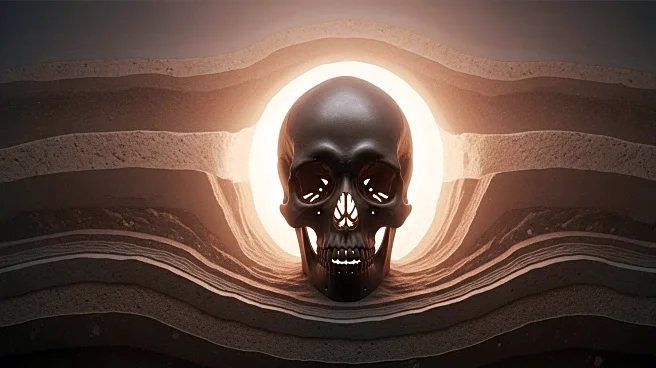What's Happening?
A recent study has revealed the discovery of a million-year-old human skull in China, which suggests that Homo sapiens may have emerged at least half a million years earlier than previously thought. The skull, named Yunxian 2, was initially believed to belong to Homo erectus, but new analysis indicates it is an early version of Homo longi, a sister species to Neanderthals and Homo sapiens. This finding challenges existing timelines and suggests that early versions of Neanderthals and Homo sapiens co-existed much earlier than previously believed. The research, conducted by scientists from Fudan University and the UK's Natural History Museum, has been published in the journal Science.
Why It's Important?
The discovery of the Yunxian 2 skull has significant implications for our understanding of human evolution. It suggests that large-brained humans may have evolved much earlier than previously thought, potentially altering the timeline of human development. This could lead to a reevaluation of the interactions and interbreeding between different human species over a longer period. The findings may also prompt further exploration and analysis of ancient human fossils across the globe, potentially uncovering more evidence of early Homo sapiens. This research could reshape theories about the geographical origins of modern humans and their evolutionary journey.
What's Next?
Further research and analysis are needed to confirm the conclusions drawn from the Yunxian 2 skull. Scientists may seek additional genetic data and fossil evidence to support the earlier timeline of human evolution. The study's findings could lead to increased interest in exploring other regions for ancient human fossils, particularly in Asia, Africa, and Europe. As more evidence is gathered, the scientific community may need to revise existing models of human evolution and consider new hypotheses about the interactions between early human species.
Beyond the Headlines
The discovery raises questions about the ethical and cultural implications of redefining human evolution. It challenges long-held beliefs and may influence how societies perceive their historical and biological heritage. The research also highlights the importance of international collaboration in scientific endeavors, as the study involved experts from multiple countries working together to uncover new insights into human history.








